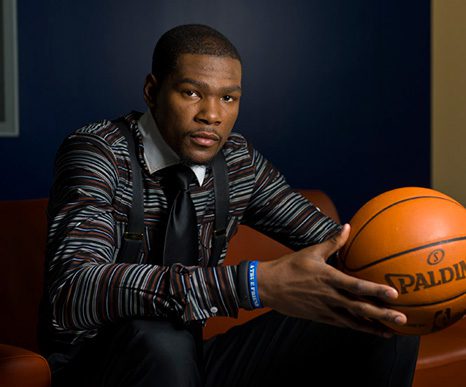
Showdown With Destiny
On paper, Durant’s background resembles the prototypical story of many pro athletes. He was raised in a challenged but not deplorable neighborhood just outside Washington D.C. by his hard-working mother, Wanda Pratt, and his grandmother, Barbara Davis. He played youth ball, fixed his sights on the NBA, played high school ball, and then after a single year of college, elected to enter the league’s rookie draft. It’s been the outline of a story for both stars and for young men who never quite made it and later regret their decisions.
But scratch the surface of Durant’s story and you find neither cliché nor cautionary tale. Instead, it’s more of an American dream, with an overlay of destiny.
Durant first crossed paths with that destiny when he was about 11 years old.
“One day I was at church with my mom and my brother,” Durant reflects. “The pastor didn’t know us at all. But when we spoke to him, he looks at me and says, ‘You’re going to play in the NBA and your brother is going to be there to help you.’ Just out of nowhere. I believed him. Later, my mom asked me if he’d told me what college I would go to.”
Durant smiles after recounting the tale. Some professional athletes never let smiles touch their eyes. He’s not one of them.
“I don’t think I ever told anyone that story before,” he continues softly.
Durant was already tall for his age at the time, but he says he was not the star on his youth league team. His Prince George Jaguars won two national championships with Durant on board, the first when he was just 11 years old. He scored 18 points in the second half of that game, lighting his desire to compete at the highest level in the sport. By that time, Durant was already friends and teammates with Michael Beasley and Chris Braswell – both of whom would also go on to play in the NBA.
It was around this time that Durant struck up a relationship with youth coach, Taras “Stink” Brown, who became a mentor and strong influence on the developing player. Brown and Pratt crafted a disciplined plan for Durant’s on-court development. As part of that plan, intense drills were emphasized and pick-up games were discouraged, since they encourage bad habits and ball hogging. The roots of Durant’s focus on teamwork developed early. He credits his mother for keeping him on track with school and ball.
“My mom was tough,” Durant says. “She’s still tough. I didn’t have a lot of friends when I was in school. I would go to school by myself and run straight to the gym.”
His closeness with his family was integral to Durant’s youth.
“My mother was always working so hard,” he says. “She worked so hard for us. She would leave before we would wake up. She made sure that we lived comfortably. But she was also always at games and let us travel when we needed to for games.”
Durant says that even during high school, most of the time the spotlight was not on him.
“I was point guard, ‘Kevin Basic,’” he says, because of his concentration on basketball’s essential skills, as opposed to flashier play. “I might have a spin move or something.”
Still, in his second year at Montrose Christian in Rockville, Md., the Washington Post named him the area Player of the Year. Then, as a junior, he transferred to basketball powerhouse Oak Hill Academy, where he flourished and was voted a Second Team All-American by Parade Magazine. He took his game to National Christian Academy and continued to excel under legendary coach Stu Vetter. There, Durant was named a McDonald’s All-American and was honored as co-MVP of the 2006 McDonald’s All-Star Game.
By the time he was a senior, Durant’s years of drilling in fundamentals and physical gifts elevated him to the attention of many major college programs. His speed and ball-handling gifts were already collegiate point guard level, and although Durant scored in droves, he used his well-practiced skills to distribute the ball as needed for the team to succeed. That too wasn’t missed by scouts for college programs.
Despite the attention of numerous major college programs, Durant decided on the University of Texas.
“I liked the colors,” Durant quips. His eyes dance. “That’s not the only reason…”


























